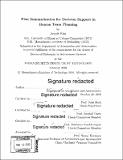| dc.contributor.advisor | Julie Shah. | en_US |
| dc.contributor.author | Kim, Joseph,Ph.D.Massachusetts Institute of Technology. | en_US |
| dc.contributor.other | Massachusetts Institute of Technology. Department of Aeronautics and Astronautics. | en_US |
| dc.date.accessioned | 2020-10-18T21:23:59Z | |
| dc.date.available | 2020-10-18T21:23:59Z | |
| dc.date.copyright | 2020 | en_US |
| dc.date.issued | 2020 | en_US |
| dc.identifier.uri | https://hdl.handle.net/1721.1/128054 | |
| dc.description | Thesis: Ph. D., Massachusetts Institute of Technology, Department of Aeronautics and Astronautics, 2020 | en_US |
| dc.description | Cataloged from the PDF of thesis. | en_US |
| dc.description | Includes bibliographical references (pages 155-168). | en_US |
| dc.description.abstract | Humans often make their plans in groups, sharing information, ideas, and preferences before arriving at a final plan. Human team planning sessions, however, often suffer from inefficiencies such as getting off topic, losing track of goals, and leaving meetings with a lack of shared understanding between the team members. Humans also tend to overlook constraints and lose situational awareness when presented with a large amount of data. The complexities of both the planning task and social factors can cause the necessity to hold additional meetings and degrade performance during plan execution. In order to alleviate the aforementioned challenges, Al researchers have been developing human-agent planning systems (also called human-aware or human-in-the-loop planners) to reduce the cognitive load of humans and help them generate high-quality plans prior to execution. Existing systems, however, mainly focus on dyadic interaction between a single human planner and a single Al agent. | en_US |
| dc.description.abstract | There exists a need for decision support systems that can properly monitor and support the plan-making of human teams. In this thesis, I develop two classes of plan summarization algorithms in the context of human team planning. First, I develop a novel plan recognition algorithm to infer the human team's final plan from a structured form of their natural language conversation. The key idea is to leverage dialogue features from the team's planning conversation to monitor the team's overall agreement process. I show that by combining such contextual information with symbolic planning models, state-of-the-art summarization accuracy can be achieved. I also show that my model is generalizable across different discussion topics and to planning problems of various representations (e.g. PDDL, MDPs, or MILPs). Second, I focus on the problem of summarizing a dataset of plan traces, for a setting where the agent does not have access to a symbolic planning model. | en_US |
| dc.description.abstract | I develop an algorithm to infer contrastive Linear Temporal Logic (LTL) specifications from a dataset of positive and negative traces. The motivation is that, even in this model-free setting, the agent can be used as an information-gatherer, communicating to humans any insightful rules learned from historical data. I introduce a novel probabilistic model that generates multiple contrastive LTL specifications while offering robustness to noisy input. Finally, I conduct an in-depth user study to assess the various properties of LTL specifications and how they impact human interpretability. I develop a new quantitative measure to gauge the "interestingness" of LTL specifications, and through human subject experiments I show that it aligns better to actual human intuition than an existing method. | en_US |
| dc.description.statementofresponsibility | by Joseph Kim. | en_US |
| dc.format.extent | 168 pages | en_US |
| dc.language.iso | eng | en_US |
| dc.publisher | Massachusetts Institute of Technology | en_US |
| dc.rights | MIT theses may be protected by copyright. Please reuse MIT thesis content according to the MIT Libraries Permissions Policy, which is available through the URL provided. | en_US |
| dc.rights.uri | http://dspace.mit.edu/handle/1721.1/7582 | en_US |
| dc.subject | Aeronautics and Astronautics. | en_US |
| dc.title | Plan summarization for decision support in human team planning | en_US |
| dc.type | Thesis | en_US |
| dc.description.degree | Ph. D. | en_US |
| dc.contributor.department | Massachusetts Institute of Technology. Department of Aeronautics and Astronautics | en_US |
| dc.identifier.oclc | 1199059756 | en_US |
| dc.description.collection | Ph.D. Massachusetts Institute of Technology, Department of Aeronautics and Astronautics | en_US |
| dspace.imported | 2020-10-18T21:23:51Z | en_US |
| mit.thesis.degree | Doctoral | en_US |
| mit.thesis.department | Aero | en_US |
